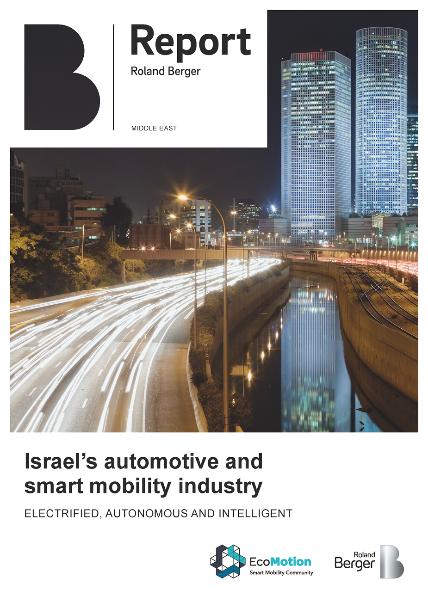Hitting the next gear: Israel's smart mobility market in 2021
![{[downloads[language].preview]}](https://www.rolandberger.com/publications/publication_image/RB_SocialMediaAssets_SmartMobility_Israel_DT_download_preview.jpg)
Learn more about the smart mobility market in Israel, what trends shape their smart mobility landscape and what role mobility startups have in this ecosystem.


Over the last decade, Israel has become a leading mobility technology hub. In this sector, the country is home to hundreds of start-ups, exciting innovations, and significant investment opportunities. First published in 2016, our studies on smart mobility in Israel trace the tremendous growth of Israel's mobility ecosystem. For example, the total number of mobility startups grew by 50% since 2016 and more than 20 OEMs and OESs opened local R&D and innovation centers. This considerable growth makes the Israeli ecosystem an important case study for stakeholders of the mobility of the future.
"While drawing on our previous findings, the 2021 Israeli Mobility Study expands the analysis to a full spectrum of stakeholders that might benefit from the country’s innovative prowess."
Following our 2016 and 2018 reports, this third edition of our study draws on conclusions from previous studies and updates our findings based on inter alia the insights of 20 interviews and a survey with more than 50 respondents. We also take a closer look at how recent geopolitical developments in the region can affect the Israel smart mobility landscape.
Four megatrends are reshaping the global mobility landscape: new Mobility, Autonomous driving, Digitalization, and Electrification (aka “MADE'' trends ). Fueled by these trends, the automotive and mobility industry will undergo rapid, impactful and lasting change. Key drivers for the emergence of the MADE trends are the demand for more efficient mobility and the availability of technological solutions. By providing the necessary solutions to meet this demand, mobility startup hubs such as Israel significantly contribute to the ongoing disruption and are able to capture significant value.
In recent years, the Israeli mobility startup ecosystem experienced significant growth across key dimensions.
Despite Israel’s continued growth of mobility startups, some challenges remain. Access to financing, international expansion and access to talent were named as the biggest challenges. Less frequently startups mentioned the challenges of access to pilot production, access to testing and unfavorable laws & regulations.
With the signing of the "Abraham Accords" in August 2020, diplomatic relations between the UAE and Israel improved. The UAE have set themselves ambitious goals with respect to adopting smart mobility solutions and launched a dedicated fund for tech startups in the Middle East. Going forward, we expect the UAE to become a valuable partner for Israeli mobility startups as an investor and strategic partner for the deployment of their technology.
Israel remains an exciting market to watch with a bright outlook for automotive and mobility innovation. While the Covid pandemic may have slowed some growth plans, most start-ups managed to navigate the challenges well. Looking ahead, we expect the growth trajectory of the Israeli mobility ecosystem to continue with increased engagement from OEMs and OESs and rising investments from Israel and abroad.

![{[downloads[language].preview]}](https://www.rolandberger.com/publications/publication_image/RB_SocialMediaAssets_SmartMobility_Israel_DT_download_preview.jpg)
Learn more about the smart mobility market in Israel, what trends shape their smart mobility landscape and what role mobility startups have in this ecosystem.
